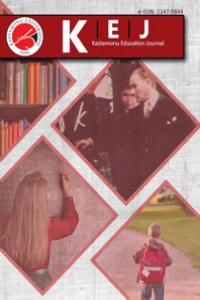Abstract
Çalışmanın amacı: Bu çalışmanın amacı, bilimsel süreç becerilerine dayalı olarak tasarlanan etkinliklerle yapılan uygulamalar neticesinde öğrencilerin kazandığı hipotez kurma beceri düzeylerini tespit etmektir.
Materyal ve Yöntem: Bu çalışmada, yapılandırmacı öğrenme yaklaşımı kapsamında; öğrenciyi aktif kılan, bilimsel süreç becerileri dikkate alınarak hazırlanan, hipoteze dayalı deney tekniği uygulamalarını içeren, 10 etkinlikten oluşan ve Yaz (2018) tarafından geliştirilen bir laboratuvar eğitim materyali Eğitim Fakültesi Fen Eğitimi Anabilim Dalı programında yer alan Genel Kimya Laboratuvarı I dersinde kullanılmıştır. Bu araştırma, Eğitim Fakültesinde Fen Bilgisi Öğretmenliği bölümü 1. sınıfta öğrenim gören 31 öğrenci ile yürütülmüştür. Genel Kimya Laboratuvarı I dersleri, 10 hafta boyunca, bilimsel süreç becerilerine dayalı olarak geliştirilen etkinliklerle yürütülmüştür. Bu araştırma, betimsel desene sahip bir araştırma türüdür ve nitel araştırma yaklaşımına uygun olarak tasarlanmıştır. Etkinliklerden gerçekleştirildikten sonra, öğrenci raporları üzerinde içerik analizi yapılmış ve öğrencilerin hipotez kurma becerileri tespit edilmiştir.
Bulgular: Gerçekleştirilen etkinlikler sonrasında, öğrenci deney sonuç raporları üzerinde yapılan içerik analizleri neticesinde, önemli sayıda öğrencinin deneyin konusu hakkında en az bir veya daha fazla araştırılabilir ve test edilebilir hipotez oluşturabildiği sonucuna varılmıştır.
Önemli Vurgular: Oluşturulan hipotezlerin önemli bir kısmının araştırılıp test edilebildiği ve uygulamalar sırasında önemli bir güçlükle karşılaşılmadığı sonucuna varılmıştır. Test edilebilir ve anlamlı hipotezler kurabilen öğrencilerin oranının (%80), bu tür hipotezleri kuramayanların oranından (%20) daha yüksek olduğu belirlenmiştir. Ayrıca süreç becerilerinin kazanılmasına yönelik tasarlanan bu tür etkinliklerin hem öğrencilere yeterli süreç becerilerinin kazanılmasına hem de bu becerilerin kalıcılığına olumlu katkı sağlayabileceği söylenebilir.
References
- Alouf, L, J., & Bentley, M.L. (2003). Assessing the impact of inquiry-based science teaching in professional development activities, PK-12. A Paper Presented at the 2003 Annual Meeting of the Association of Teacher Education.
- Altunışık, R., Coşkun, R., Yıldırım, E., & Bayraktaroğlu, S. (2001). Sosyal bilimlerde araştırma yöntemleri. Adapazarı: Sakarya Kitabevi.
- Ayas, A. Çepni, S. & Akdeniz, A. R. (1994). Fen bilimleri eğitiminde laboratuvarın yeri ve önemi-II. Çağdaş Eğitim, (205) 7–11.
- Ayas, A., Çepni, S., Johnson, D., & Turgut, M. F.(1997). Fizik öğretimi. Bilkent, Ankara: YÖK/Dünya Bankası MEGP Hizmet Öncesi Öğretmen Eğitimi Yayınları.
Abstract
Purpose: This study aimed to determine the skill level of hypothesis gained by the students as a result of the applications made with the activities designed based on Scientific Process Skills.
Design/Methodology/Approach: In this study, in the context of constructivist learning approach; A laboratory training material which has been developed by Yaz (2018), consisting of 10 activities, which includes hypothesis-based experimental technique applications, enriched in terms of scientific process skills, has been used in the General Chemistry Laboratory-I course in the Faculty of Education Science Education program.
This research was carried out with 31 students studying in the first grade of the Science Teaching Department in the Faculty of Education. General Chemistry Laboratory I courses were conducted for 10 weeks with activities developed based on scientific process skills. This research is a descriptive research type and designed according to the qualitative research approach. After performing the activities, content analysis was conducted on the student reports, and the students' ability to form hypotheses were determined.
Findings: As a result of the content analysis conducted on the students’ experimental results reports, it was concluded that a significant number of students were able to construct at least one or more researchable and testable hypotheses about the subject of the experiment.
Highlights: It was concluded that a significant part of the hypotheses established could be investigated and tested, and no significant difficulties were encountered during the applications. It was determined that the rate of students who could establish testable and meaningful hypotheses (80%) was higher than the rate of students who could not establish such hypotheses (20%). In addition, it can be said that such activities designed for the acquisition of process skills can contribute positively to both the acquisition of adequate process skills to the students and the permanence of these skills.
Keywords
Establishing hypothesis Hypothesis building skills Llaboratory activities Llaboratory activities, science education. Scientific process skills
References
- Alouf, L, J., & Bentley, M.L. (2003). Assessing the impact of inquiry-based science teaching in professional development activities, PK-12. A Paper Presented at the 2003 Annual Meeting of the Association of Teacher Education.
- Altunışık, R., Coşkun, R., Yıldırım, E., & Bayraktaroğlu, S. (2001). Sosyal bilimlerde araştırma yöntemleri. Adapazarı: Sakarya Kitabevi.
- Ayas, A. Çepni, S. & Akdeniz, A. R. (1994). Fen bilimleri eğitiminde laboratuvarın yeri ve önemi-II. Çağdaş Eğitim, (205) 7–11.
- Ayas, A., Çepni, S., Johnson, D., & Turgut, M. F.(1997). Fizik öğretimi. Bilkent, Ankara: YÖK/Dünya Bankası MEGP Hizmet Öncesi Öğretmen Eğitimi Yayınları.
Details
| Primary Language | English |
|---|---|
| Subjects | Studies on Education |
| Journal Section | Research Article |
| Authors | |
| Publication Date | May 25, 2021 |
| Acceptance Date | February 1, 2020 |
| Published in Issue | Year 2021 Volume: 29 Issue: 2 |

